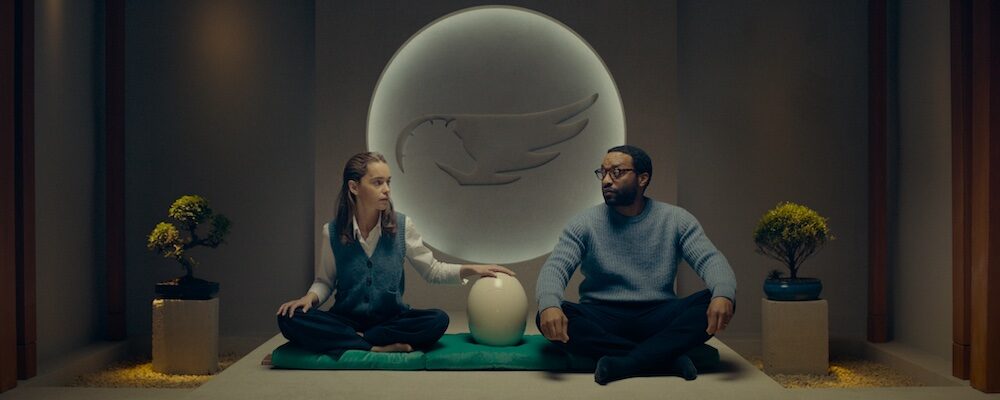‘The Pod Generation’: Reproducing in a Futuristic World
Sandra Miska
AI technology creates a new kind of future for fertility in “The Pod Generation,” a sci-fi drama set in New York City at the end of the 21st century. Emilia Clarke stars as Rachel, a successful woman who not only works in the field of Artificial intelligence, but also takes advantage of modern technology when it comes to “growing” her family. Though Rachel has it down to a science, she meets resistance from her husband, Alvy (Chiwetel Ejiofor), a botanist who has dedicated his life and work to connecting with the natural world.
Writer-director Sophie Barthes does an excellent job here of presenting the technology as being advanced, but not too advanced that the viewer cannot imagine these options becoming a reality in the not-so-distant future. At work, Rachel presents a new AI office assistant, and someone voices their concern that AI could put them out of work. But Rachel insists that the AI will only serve to enhance their lives, and for the most part, that is true of most everything we see. Rachel even sees an AI therapist, Eliza, who offers a lot of decent advice. As someone who embraces tech, it comes as no surprise that she is intrigued when her work offers to help her pay to have a baby at the Womb Center.
What is the Womb Center, you ask? It is a place where couples (or single women) can go to have in vitro babies, but instead of inserting the embryo in a parent or a surrogate, it does into an egg-shape pod, one complete with a window into which the parents can watch the fetus develop. The customers at the Womb Center do not necessarily have fertility problems, but are attracted to the pods because they supposedly free women from the burden of pregnancy. And, because the pods are mobile and still need to be fed and may or may not benefit from outside stimulation, both parents are able to equally participate in the “pregnancy.” To the surprise of Rachel, and the viewer, Alvy turns out to be the parent who feels the most connected to the pod.
What “The Pod Generation” does best is present an interesting conversation about feminism and reproduction. Rachel’s company helps her pay for the Womb Center in order to retain and ostensibly support female employees, but when Rachel brings the pod to the office one day, she receives pushback and is told it is a distraction by her boss, proving that her employers’ talk of female empowerment is mostly lip service. At one point, Rachel and Alvy encounter radical feminist protestors outside of The Womb Center. These women are presented as a version of the trans-exclusionary radical feminists we hear so much about today, but this issue is not explored as deep as it could be.
“The Pod Generation” is an impressive film when it comes to visuals, full of beautiful, even soothing shots. It also gives a lot to ponder when it comes to technology and the future, and Clarke and Ejiofor both give impressive performances. Eventually, Rachel and Alvy became disillusioned with the Womb Center, but the film does not go as far as it could when it comes to raising the stakes. Overall, it feels very dry, and there is a missed opportunity when it comes to milking any humor out of the couple’s predicament. There is plenty of missed opportunity when it comes to leaning into the absurdity of the couple’s situation. Overall, the film has a lot of great things going for it, but it never lives up to its full potential.
“The Pod Generation” releases Aug. 11 in select theaters.

